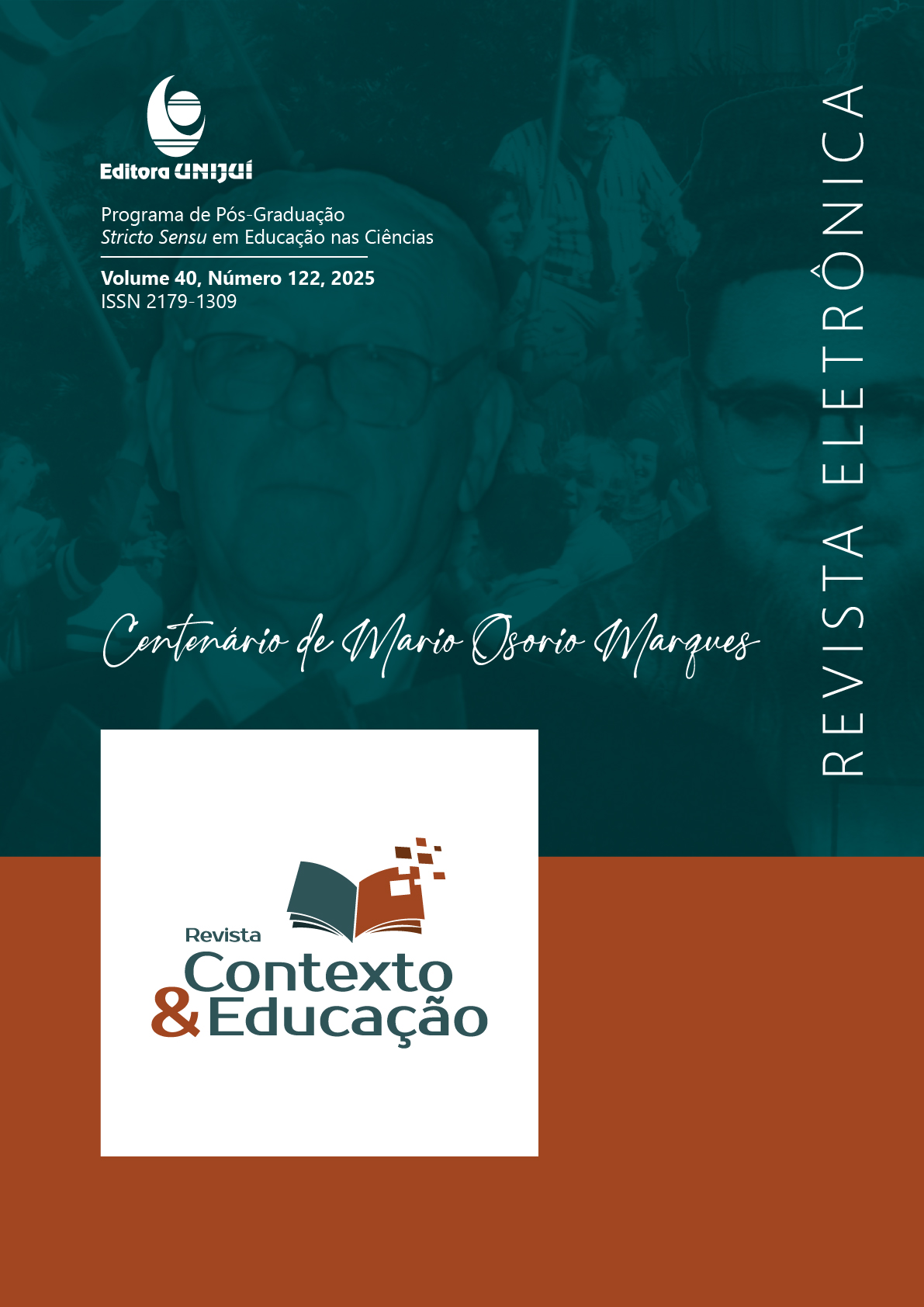Education, right to memory and truth: testimony to elucidate Brazil's underground memories
DOI:
https://doi.org/10.21527/2179-1309.2025.122.14372Keywords:
Memory, Testimonies, Human Rights, EducationAbstract
This article seeks, through qualitative analysis and critical-hermeneutic contribution, to emphasize the value of memory as a fundamental element for the notion of truth in contemporary Brazil, especially focused on the (re)construction of a memory about the dictatorial period. At first, a certain theoretical perspective on the construction of memories stands out, taking the notion of subterranean memory as one of the central concepts. Then, a case of testimonial narrative about missing persons in the Brazilian military dictatorship will be presented. In the third moment, the importance of education in resisting and combating all types of barbarism is highlighted, by admitting that, for this, the world needs to be preserved and transmitted before the arrival of each new generation.
References
ADORNO, Theodor W. Educação após Auschwitz. In: ADORNO, Theodor W. Educação e emancipação. Tradução Wolfang Leo Mar. Rio de Janeiro: Paz e Terra, 1995.
ARENDT, Hannah. Entre o passado e o futuro. Tradução Mauro W. Barbosa. 7. ed. São Paulo: Perspectiva, 2014.
ARENDT, Hannah. Origens do totalitarismo: antissemitismo, imperialismo, totalitarismo. Tradução Roberto Raposo. São Paulo: Companhia das Letras, 2012.
CANABARRO, Ivo dos S.; STRÜCKER, B. Direito à memória e à verdade: testemunhos e memórias subterrâneas da ditadura militar brasileira para a repactuação do Estado. Revista História: Debates e Tendências, [S. l.], v. 24, n. 1, p. 40-60, 2024. DOI: 10.5335/hdtv.24n.1.15346. Disponível em: https://seer.upf.br/index.php/rhdt/article/view/15346. Acesso em: 9 jan. 2025.
CANDAU, Joel. Memória e identidade. São Paulo: Contexto, 2012.
CNV. Comissão Nacional da Verdade. Relatório da Comissão Nacional da Verdade (CNV). Brasil, 2014. V. 3. Disponível em: http://cnv.memoriasreveladas.gov.br/index.php/outros-destaques/574-conheca-e-acesse-o-relatorio-final-da-cnv. Acesso em: 23 abr. 2020.
CONTE, Barbara de Souza; BAUER, Caroline Silveira. O que resta da ditadura civil-militar brasileira: vicissitudes do silenciamento e memória. In: CLÍNICAS DO TESTEMUNHO RS E SC. Por uma clínica do testemunho? Porto Alegre: Instituto APPOA – Associação Psicanalítica de Porto Alegre, 2018.
COSTA, Ana. Memória e testemunho. In: CLÍNICAS DO TESTEMUNHO RS E SC. Por uma clínica do testemunho? Porto Alegre: Instituto APPOA – Associação Psicanalítica de Porto Alegre, 2018.
HALBWACHS, Maurice. A memória coletiva. São Paulo: Centauro, 2004.
LE GOFF, Jaques. História e memória. Campinas, SP: Editora Unicamp, 1996.
FREUD, Sigmund (1930). O mal-estar na civilização. In: Obras completas. Tradução Paulo César de Souza. São Paulo: Companhia das Letras, 2010.
MAÇALAI, Gabriel; STRÜCKER, Bianca. O princípio da igualdade aristotélico e os seus debates atuais na sociedade brasileira. In: CONGRESSO BRASILEIRO DE PROCESSO COLETIVO E CIDADANIA, 2018. Anais [...], 2018.
NEGREIROS, Dário. Reparação psíquica para quem? In: CLÍNICAS DO TESTEMUNHO RS E SC. Por uma clínica do testemunho? Porto Alegre: Instituto APPOA – Associação Psicanalítica de Porto Alegre, 2018.
POLLAK, Michel. Memória, esquecimento, silêncio. In: Estudos Históricos, Rio de Janeiro: CPDOC/FGV, v. 2, n. 3, p. 3-15, 1989. Disponível em: https://cpdoc.fgv.br/. Acesso em: 10 abr. 2020.
SILVA, Kalinda Vanderiel; SILVA, Maciel Henrique. Verbete memória. In: SILVA, Kalinda Vanderiel; SILVA, Maciel Henrique. Dicionário de conceitos históricos. São Paulo: Contexto, 2005.
VARGAS, Marluce Cardoso. Possibilidades de fontes e arquivos sobre o tema de filhas (os) de perseguidos políticos pela ditadura militar brasileira. In: CLÍNICAS DO TESTEMUNHO RS E SC. Por uma clínica do testemunho? Porto Alegre: Instituto APPOA – Associação Psicanalítica de Porto Alegre, 2018.
Downloads
Published
How to Cite
Issue
Section
License
Copyright (c) 2025 Revista Contexto & Educação

This work is licensed under a Creative Commons Attribution 4.0 International License.
By publishing in Revista Contexto & Educação, authors agree to the following terms:
All works are published under the Creative Commons Attribution 4.0 International License (CC BY 4.0), which allows:
Sharing — to copy and redistribute the material in any medium or format;
Adaptation — to remix, transform, and build upon the material for any purpose, even commercially.
These permissions are irrevocable, provided that the following terms are respected:
Attribution — authors must be properly credited, a link to the license must be provided, and any changes made must be indicated.
No additional restrictions — no legal or technological measures may be applied that legally restrict others from doing anything the license permits.
Notices:
The license does not apply to elements that are in the public domain or covered by legal exceptions.
The license does not grant all necessary rights for specific uses (e.g., image rights, privacy, or moral rights).
The journal is not responsible for the opinions expressed in the articles, which are the sole responsibility of the authors. The Editor, with the support of the Editorial Board, reserves the right to suggest or request modifications when necessary.
Only original scientific articles presenting research results of interest that have not been previously published or simultaneously submitted to another journal with the same purpose will be accepted.
Mentions of trademarks or specific products are intended solely for identification purposes and do not imply any promotional relationship by the authors or the journal.
License Agreement (for articles published from October 2025): Authors retain the copyright to their article and grant Revista Contexto & Educação the right of first publication.


